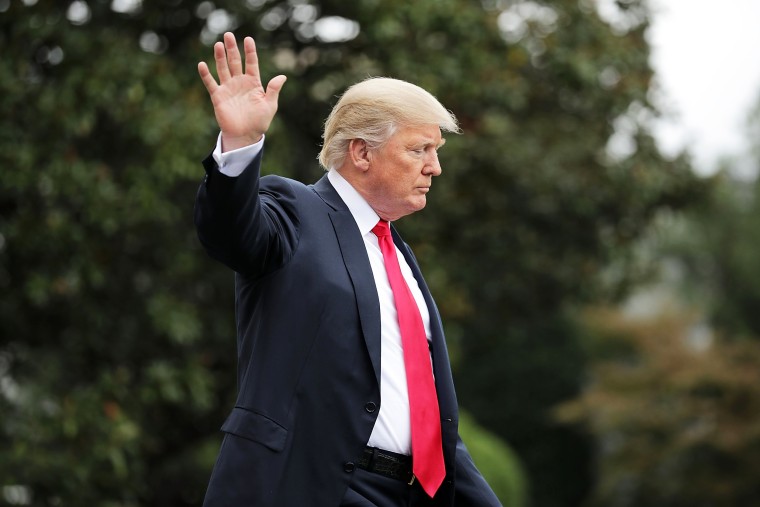WASHINGTON — Democratic lawmakers, First Amendment advocates and broadcast communications experts mobilized against President Donald Trump on Wednesday after he suggested that NBC News’ broadcast license could be revoked following a report detailing his interest in drastically increasing the nation’s nuclear arsenal.
Trump lashed out at NBC News in two tweets that dismissed reports that he had asked for a nearly tenfold increase in the country's nuclear stockpile at a July meeting with top national security officials. After that meeting, Secretary of State Rex Tillerson called Trump "a moron," three officials in the room told NBC News.
“It is frankly disgusting the press is able to write whatever it wants to write,” Trump later told reporters gathered in the Oval Office to cover his meeting with Canadian Prime Minister Justin Trudeau.
Trump's suggestion that the government's power be used to challenge network broadcast licenses was met with condemnation but also confusion over a threat that seems to have little teeth. Networks do not have federal licenses and, broadcast communications experts say, the president has few options to curtail even the individual affiliates that do have licenses.
The FCC did not issue a response to the tweets, though one of its five commissioners took to Twitter to refute the president.
"Not how it works," Jessica Rosenworcel posted with a link to the group's manual for licensing.
“Today’s call by the president of the United States to challenge the licenses of networks is not only dangerous to the American people’s right to access responsible journalism, it represents a clear misunderstanding on his part of how much control the federal government can exercise as it relates to networks and cable channels,” Dan Shelley, the executive director of the Radio Television Digital News Association, said in a statement.
The National Association of Broadcasters called it "contrary" to the Constitution for the president to make the threat.
Sen. Ben Sass, R-Neb., took to Twitter to tell Trump his comments veered toward a violation of his oath to uphold the Constitution. "Mr. President: Are you recanting of the Oath you took on Jan. 20 to preserve, protect, and defend the 1st Amendment?" Sasses tweeted Wednesday night.
Though Trump may not have a clear legal recourse to take action against broadcast networks whose reporting he objects to, advocates of both free speech and the press continue to warn about the impact of the president's longstanding feud with the media.
"He doesn't have the legal power to deny licenses, but this has a chilling effect," said Michael Copps, a former FCC commissioner who served as the acting commissioner in 2009. It is extremely rare, Copps said, for a broadcast station to lose its license over content.
Since declaring his candidacy in 2015, Trump has waged war with the so-called fake news media that he feels has covered him unfairly. He has denied certain outlets access to his presidential rallies and in February White House staffers blocked some reporters from attending briefings.
His frequent spats continue to draw comparisons to President Richard Nixon's disdain for the media. And similar to Trump, Nixon seemed to have tried to revoke broadcast licenses for Washington Post Co.-owned TV stations amid the newspaper's coverage of Watergate.
"I thought those days of intimidation with regard to trying to use the FCC as a political weapon were passed," Copps said.
Democratic lawmakers echoed the concerns of media advocacy groups, with Sen. Ed Markey of Massachusetts writing FCC Chairman Ajit Pai to "publicly refuse to challenge the license of any broadcaster because the president dislikes its coverage."
But others, like former National Association of Broadcasters President David Rehr, said he viewed the president's tweet as more of a political ploy than an earnest threat against media.
"The president wants to dig at the media, and this is an institutional struggle for hearts and minds," Rehr, who now teaches law at George Mason University, said. "I do not think there is some conspiracy theory. He's upset."

